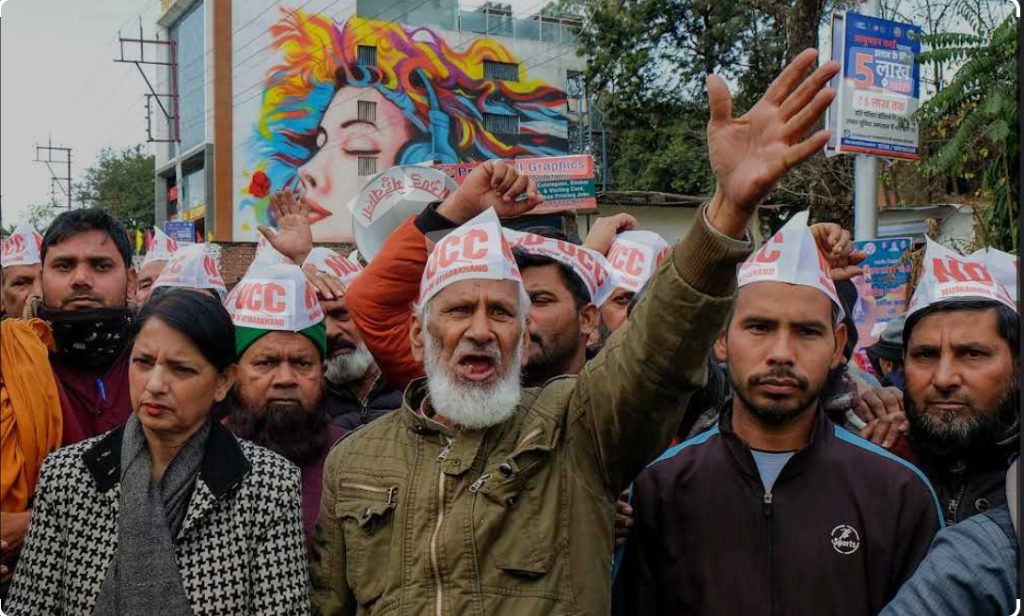With an eye on the upcoming 2024 LS poll, the BJP government of Uttarakhand has passed the controversial Uniform Civil Code in the legislative assembly. This will serve as a litmus test for Modi government before potentially implementing it in other BJP-ruled states. A report by Mudit Mathur

Positioning to woo the majority community in the upcoming 2024 general elections, the BJP government of small state of Uttarakhand recently passed the controversial Uniform Civil Code 2024 (UCC) in the legislative assembly, possibly as a trial run before implementing it in other states that it governs.
The Muslim community plans to challenge the constitutionality of the UCC in the apex court. The move has triggered a debate over the potential conflict with citizens’ fundamental right to privacy. The new law requires citizens to compulsory register their live-in relationships within a stipulated time frame or face strong punitive actions, including fines and imprisonment.
It has caused concern as it will apply to all residents of Uttarakhand, even if they settle down in other states of India. The Uniform Civil Code (UCC) will be uniformly applied to people in Uttarakhand across religions, with the exception of a section of tribal populations.
The BJP had promised a Uniform Civil Code in its election manifesto, along with the removal of Article 370 from Jammu and Kashmir and the construction of the Ram Mandir in Ayodhya. These pledges were made with the aim of consolidating the majority community of the country through ideological polarization. Union Home Minister Amit Shah pushed the narrative further by announcing to notify the Citizenship (Amendment) Act (CAA) before Lok Sabha polls.The act was passed by the Parliament in December 2019.
Shah stressed that the CAA was brought in to provide citizenship and not “take away anyone’s citizenship.” “CAA was a promise of the Congress government. When the country was divided and the minorities were persecuted in those countries, Congress had assured the refugees that they were welcome in India and they would be provided with Indian citizenship,” Shah claimed, while addressing the Global Summit of a media group.

However, the controversy over CAA had led to incidents of retaliatory violence that witnessed communal tensions all over the country amid huge protests and selective use of draconian sedition law against the protesters. It also witnessed a growing sense of insecurity among the minority community about the alleged misuse of the law.
On the implementation of UCC in the state of Uttarakhand, the chairman of Parliamentary Standing Committees on Home Affairs, Law, and Commerce and eminent lawyer, Abhishek Manu Sanghvi said, “It is clearly a political and symbolic gesture, unleashed just before (Lok Sabha) elections, with the usual great event management and fanfare for which the BJP is famous. If the UCC is to have any meaning, it has to be the product of all-India consensus in a single national law.” “The BJP is far away from that, so it has gone ahead and done this usual tokenism, very similar to the Women’s Reservation Bill we saw a short while ago,” the Congress leader added.
The Uniform Civil Code has entered a totally new area by introducing provisions of formalising what was previously been in the realm of informal sexual relationship between consenting adults and raises constitutional concerns over privacy and personal liberty. It is difficult to understand the purpose for which the provisions of registering a live-in relationship have been included in the UCC drafted by an expert committee headed by Justice (retd) Ranjana P. Desai of the Supreme Court. The criticism against it is that there has not been appropriate discussion among communities or even in the state legislature. While many of its provisions are controversial, an issue that has raised much heat is the provision for mandatory registration of live-in relationships.
It overthrows the very purpose of a live-in relationship as it renders it on par with a formal marriage, with conditions for entering into a relationship similar to a marriage contract — monogamy, prohibited degrees of relationships, etc., UCC stipulates non-registration to be a criminal offence with a fine of Rs 10,000 and/or imprisonment of three months. In the event of failure to produce a certificate of live-in relationship, a term of six months is prescribed on conviction and/or fine of Rs 25,000. Similarly, as is the case in marriage (and divorce), one has to register the contract with the registrar at the time of entering into a relationship and also upon terminating the same.
The Code provides for maintenance for a woman “deserted” by her partner, similar to a married woman, Section 388 states: “If a woman gets deserted by her live-in partner, she shall be entitled to claim maintenance from her live-in partner, for which she may approach the competent court having jurisdiction over the place where they last cohabited.” The Code further provides that a child born in a live-relationship is a legitimate child. While this is the prevailing legal position, under the UCC, it is codified as law.
These provisions alter the entire personal relationship from an informal one into one governed by a draconian and stiff criminal law. The entire objective seems to be to deter young couples from entering into such relationships, which raises questions about individual’s privacy and liberty guaranteed under the Constitution of India.
The Code also defines heterosexual relationship as a “relationship between a man and a woman” who “cohabit in a shared household through a relationship in the nature of marriage, provided that such relations are not prohibited.”
Most young adults may not want this kind of state protection which abridges their freedom to not choose marriage but to stay in a consensual relationship without the intrusion of the state apparatus into their private lives.
Uttarakhand’s UCC Bill which seeks to “govern and regulate the laws related to marriage and divorce, successions, live-in relationships, and matters related thereto”, was passed in the Assembly on 7th February after two-day discussion. The Bill will now be sent to President Droupadi Murmu for her assent, after which it will become law. After the Act gets the presidential assent, Uttarakhand will become the first state after Independence to get a common law on marriage, divorce, land, property and inheritance for all citizens, irrespective of their religion.
Chief Minister Pushkar Singh Dhami said it is not an ordinary legislation. “The Uniform Civil Code (UCC) will create equal laws for men and women across all faiths and will help create a non-partisan and non-discriminatory society. It will especially protect the rights of women and put an end to their exploitation,” Dhami remarked. “It fulfils a commitment we had made to the people of the state in the run-up to the 2022 assembly polls. It is a small contribution from Uttarakhand to building a developed India under the leadership of Prime Minister Narendra Modi,” triumphant Dhami claimed.
The Muslim community would challenge the constitutionality of the recently passed Uniform Civil Code in the Supreme Court and further they would continue to protest against it by way of civil disobedience. They termed the Bill an attempt to impose the laws of one religion on others. After deliberating intricacies of the newly applicable Uniform Civil Code 2024 with several prominent members of the Muslim community in a meeting at Paltan Bazar Jama Masjid, Dehradun, Qazi Maulana Mohammad Ahmad Qasami announced it before the media.
West Bengal Chief Minister Mamata Banerjee criticised the BJP for bringing up the issues of CAA, NRC and Uniform Civil Code (UCC) before the Lok Sabha elections and asserted that Bengal will show the way on how to fight against the divisive politics of the saffron camp. She alleged that the BJP “opportunistically raised” the issue of the Citizenship (Amendment) Act ahead of the upcoming elections. “This is nothing but politics,” she said at a post- state Budget press conference.













